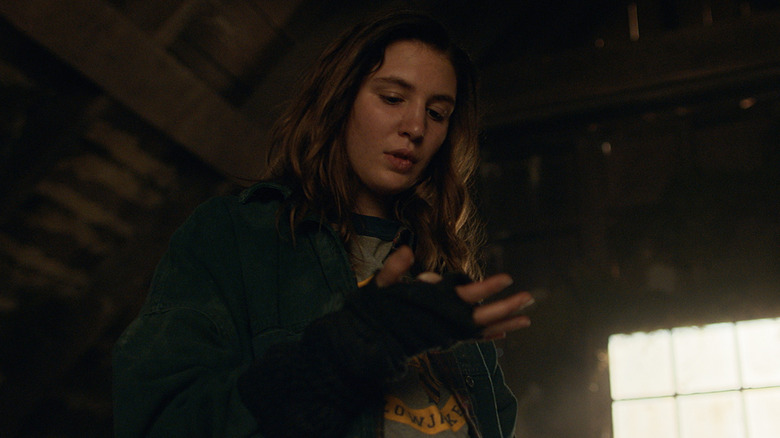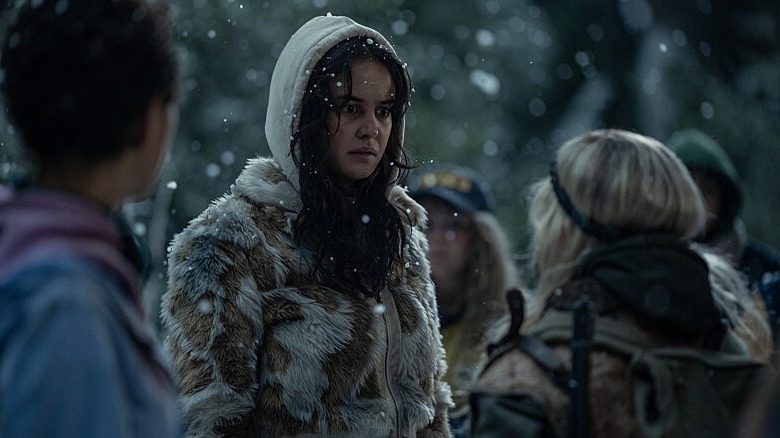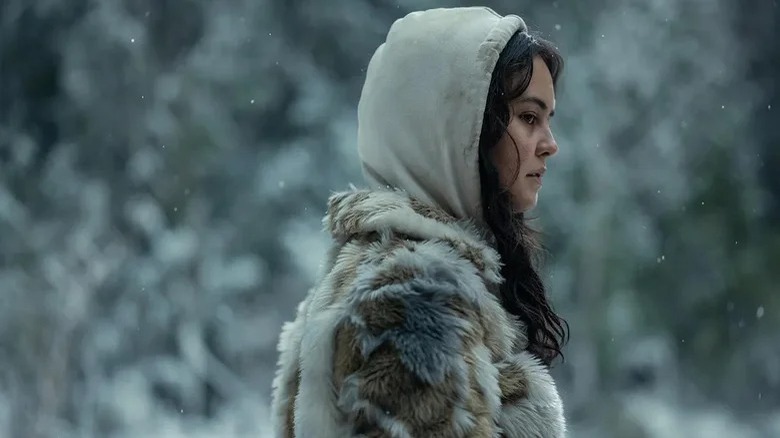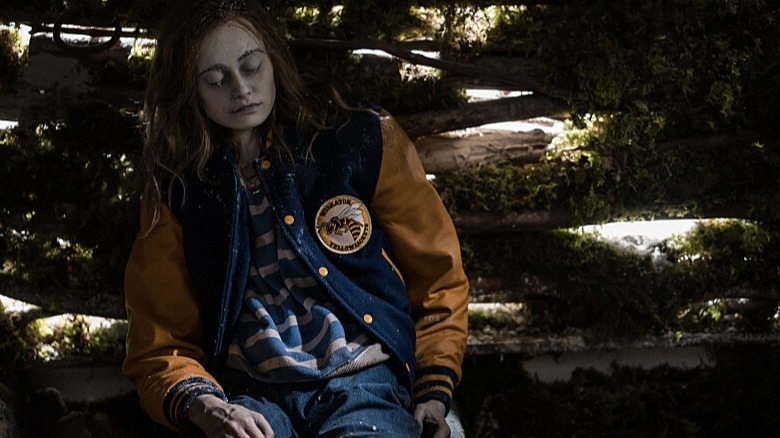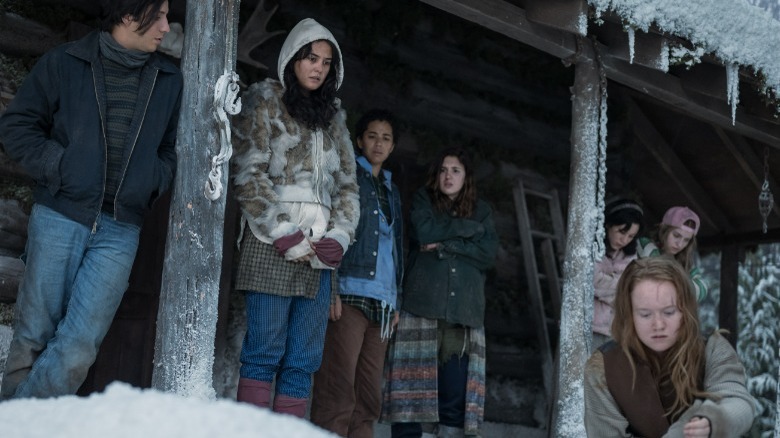Yellowjackets Season 2's Grossest Scene So Far Echoes An Old Tradition
This post contains spoilers for the second episode of "Yellowjackets" season 2.
Well, it finally happened. After a full season spent alluding to potential acts of cannibalism that took place during the Yellowjackets' time in the wilderness, the second season of the hit Showtime series dove right in with a dark feast featuring long-dead Jackie (Ella Purnell) as the main course.
After Shauna's (Sophie Nélisse) ear snack last week, "Yellowjackets" finally broached the topic of cannibalism at the end of the new season's second episode, in a scene that makes the desperate measure seem at once disgusting, divine, and eerily understandable. It's a nearly wordless scene that begins when a strong smell wakes up the girls inside the cabin. They attempted to cremate Jackie's body, and the smell of her charred flesh hits their nostrils like the aroma of a backyard barbecue. "She wants us to," hungry, pregnant Shauna says after leading the silent team out into the night. With that, they begin ripping into their dead friend's body. One of the series' long-standing mysteries turns out to be as simple as desperate hunger + really good smell = eat.
What's up with that ancient Greek feast scene?
The cannibalism scene is both elevated and made mysterious by an intercut sequence that the episode doesn't explain. In it, the group sits dressed in what appears to be Ancient Greek feast wear. They wear toga-like clothes, sport elegant hairdos, and are adorned with golden circlets, beads, and laurels. As the real-life Yellowjackets are desperate and cold in the darkness, this imagined version of them sits at a warmly lit feast table, eyeing one another tentatively before tearing into the food set before them. As they eat their fill, they become stained with wine, laughing through mouths full of fruit and meat.
This cross-cut scene is evocative, but its meaning isn't instantly clear. Unlike other scenes of hallucination or imagination, this seems less like a delusion and more like a message to the audience, meant to position the group's decision within a dark tradition. We may see them as monsters or desperate animals, but they picture themselves as (initially) civil and even celebratory in a moment that seems almost holy.
The feast scene becomes much more understandable when put within the context of ancient Greek traditions, which feature multiple myths and historical anecdotes about cannibalistic rituals and sacrifices.
The mountaintop cult of Zeus
The "Yellowjackets" feast lines up in part with several apocryphal or actual ancient Greek traditions. One is the feast of Lykaia, which writers including Pausanias and Plato referenced in terms that some scholars consider analogy or exaggeration, while others take them as history, according to historian Esther Eidinow.
The stories take place on the real-life Mount Lykaion and typically feature a cult devoted to Zeus. According to the geographer Pausanias, legend told that a man who sacrificed to Zeus on Mount Lykaion was turned into a wolf, a fate that would be made permanent if he tasted human flesh. Other accounts cited in Eidinow's work "Consuming Narratives: The Politics of Cannibalism on Mt. Lykaion" involve the sacrifice of a baby on Zeus's alter, while still more revolve around young military men who gather for a test-like feast, unaware of whether the meat they eat is actually human or animal.
"In modern times, some scholars have also seen here evidence to support the reality of a cannibalistic ritual," Eidinow writes, referring to the ritual as a "banquet." While "Yellowjackets" doesn't have a werewolf myth, it does have a group of young people gathered on the mountaintops, engaging in ritualistic consumption. Zeus, it's also worth noting, is considered the god of weather, and the harsh winter climate is the toughest obstacle the girls have faced yet. Another article, "Divine Hunger: Cannibalism in Greek Mythology" by Zeynep Tareen, explains the intersection of myth and cannibalism plainly in reference to Cronos and Zeus: "Savage mythologies render paternal cannibalism natural since they help explain cosmic events and the metamorphoses of nature."
An animalistic tradition
The feast of Lykaia isn't the only ancient Greco-Roman cult tradition the eerie "Yellowjackets" feast calls to mind; it's also reminiscent of a bacchanal, a wild, excess-filled revelry in honor of the god Dionysus. Specifically, the blending of the feast imagery and cannibalism element call to mind something called omophagia, the traditional eating of raw meat in honor of the god of fertility, nature, and revelry. While Jackie wasn't actually raw meat by this point, she still mostly fits the bill. According to Encyclopedia.com, the tradition was written about by Plutarch and Euripides, among others, and involved a sort of feast-induced frenzy that culminated in ripping apart a victim, be it animal or person, to eat raw.
"In the Dionysian tradition, both [tearing apart and eating raw] combine to form an image of what is both subhuman and superhuman, both beastlike and godlike, at the same time," according to the resource. It's a descriptor that certainly matches up with the show's cross-cut between the survivors' frantic reality and imagined godly feast. Scholar and writer Johan Tralau made mention of both the cult of Zeus and the cult of Dionysus in his work "Cannibalism, Vegetarianism, and the Community of Sacrifice," even quoting a snippet of Euripides' writing that references "completing [Zeus'] raw-eating feasts and holding torches high for the Mother of the mountain." There may not be actual Greek gods in "Yellowjackets," but the mountain certainly seems to have a spirit all its own.
Flesh made holy
While the imagery in the latest episode of "Yellowjackets" is clearly Greco-Roman inspired, the series as a whole often calls to mind a real-life incident that took place in 1972, when a boys' rugby team crash-landed in the Andes mountains. The harrowing story, which is perhaps best chronicled in an episode of the popular podcast You're Wrong About featuring survival expert Blair Braverman, ultimately featured cannibalism as the boys resorted to eating their already-deceased friends to survive.
As stomach-churning as the concept of cannibalism is (even the cults of Zeus and Dionysus were frowned upon in historical texts), the Andes crash story also includes a spiritual element. The team was composed of Christian young men, none of whom took the decision to eat a person lightly and some of whom rationalized the last-resort decision as akin to the act of taking communion. "Javier recited the New Testament verses to us: 'He who eats of my flesh and drinks of my blood will have eternal life. Take and eat, this is my body,'" survivor Roberto Canessa wrote in The Daily Mail, referencing fellow survivor Javier Methol.
Though "Yellowjackets" shrouds its feast scene in mystery, it's clear that the cross-cut sequences are meant to subvert viewers' expectations for what the show's cannibalism would finally look like when it arrived. The taboo has always been central to the show's place in the horror genre, but now that it's been shattered, it turns out that it's not an entirely grotesque situation. Instead, "Yellowjackets" calls to mind traditions with deeply spiritual overtones, ones that involve people transgressing in hopes that nature will be kinder to them as a result. It's a comparison that's at once twisted and inspired, and we would expect nothing less from "Yellowjackets."
